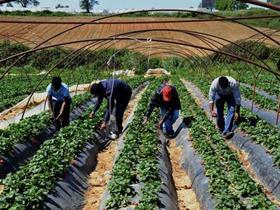
British growers are losing workers part way through picking seasons as the new National Living Wage means the tax threshold is hit earlier and they can return home before the harvest is ended.
The news is an added headache for growers who are already facing a labour crisis caused by Brexit uncertainty, as well as growing competition from other European employers such as the Netherlands, Germany or Denmark.
Berry supplier S&A Produce’s director of operations Asia Pacific, Oliver Davies, told FPJ that the fact workers are leaving part way through the season is having a bigger impact than Brexit, due to the associated training and other costs from a second recruitment drive.
“The UK is in a second recruitment drive now and it’s been difficult to fill that,” he said. “We could see British strawberries left in the ground as early as the end of this season.
“People are leaving earlier – the new minimum wage means they are leaving earlier as they reach the tax threshold earlier. They used to stay for the full season but now they can reach that amount in two to three months.”
John Hardman, director of labour supplier Hops Labour Solutions, said it’s not just higher wages that is causing workers to leave early – it’s the labour shortfall that has led to longer working weeks. “That is why this apple season has been incredibly difficult and challenging,” he said. “Because we’ve been up to 20 per cent short of staff, they’ve worked 60-hour weeks all season. Previously they would do around five and a half days and 52 hours.
“It’s a combination of crop tonnage, an earlier start to the season and staff shortages,” he said, adding that the transfer market for workers moving from soft to topfruit has all but disappeared thanks to the mid season vacuum.
“We’re desperately trying to find short placements. The problem with topfruit is it’s quite a short season,” he said. “What we’re trying to do is get the winter veg guys over earlier to cover the topfruit. They would normally start at the end of October but we’re trying to get them over now.
“We are still around 16-19 per cent down on labour. Our board is full of jobs we can’t fill. There will unquestionably be fruit left unpicked. If the raspberry industry manages to get through the season I’d be very surprised.”
Sarah Calcutt, manager of Avalon Growers Producer Organisation (AGPO), said some of the group’s growers have already been left short this season, with one company losing 15 workers who had reached the tax threshold and chosen to return home before the end of the harvest. Another grower had also lost workers part way through the season because he pays well with team bonuses, she said.
“Denmark, Germany and the Netherlands now all pay over €8.50 an hour with increases to €10 planned for 2018. Matching that is a massive challenge going forward,” she said. “Smaller growers have really suffered as they can only offer between two and three weeks work and seasonal workers have found it a less attractive option and not turned up.”
Hardman said Germany is one of the UK’s biggest competitors for labour, as it has a more preferential national insurance tax legislation.
“They can’t afford to be here longer than the tax threshold allows,” he said. “Normally a week’s notice is expected – they are technically under contract but they don’t work like that. The returnee rate is disappearing at an incredible rate. In the SAWS days the returnee rate was between 30-40 per cent, next year I’d expect it to be under six per cent.”
The industry must now step up and respond to that gap, Calcutt said, adding that AGPO is now developing a recruitment programme designed specifically to target students in the weeks before they return to university, as well as bringing locals back to fruit harvesting.
“It won’t begin to provide the numbers required though, seasonal labour is desperately needed by all parts of horticulture,” she added.
Providing workers with more formal contracts is a possibility of securing future labour, Hardman said, adding that growers may also have to pay travel costs in the future. “That’s what the food processing and butchery sectors are already having to do – they are paying flights and travel costs,” he said.



